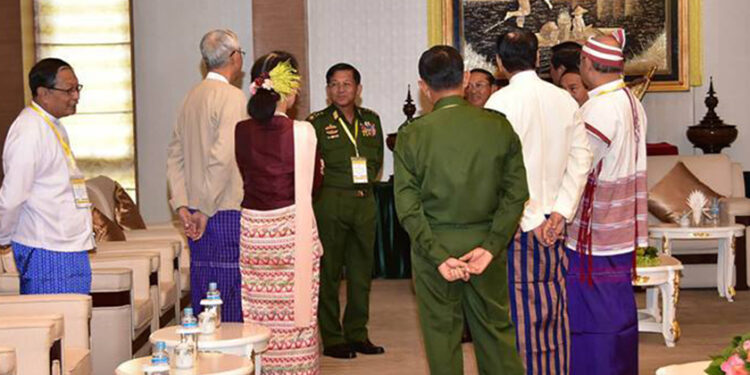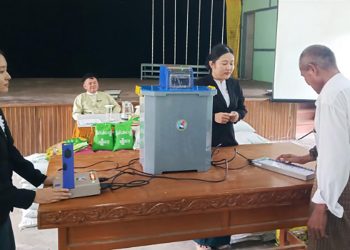Without the military’s collaboration, the democratic transition in Myanmar will go nowhere. Like it or not, it’s the realpolitik of the country and no one can discard that reality.
Unlike most countries in the world, the military here is unavoidably at the epicenter of the country’s politics constitutionally, traditionally and historically.
That’s a fact. Thus, not only domestic leaders but also international leaders must deal with its leadership to achieve their respective missions in the fragile state of Myanmar.
Many people of Myanmar loathed the military dictatorship that oppressed them for decades. The international community punished the military with sanctions for its abuse of power against its own people; its grip on power that went against international norms.
The Tatmadaw, however, is resilient in the political arena though it has faced continuous resistance throughout its rule. Sanctions from the West for 20 years didn’t make the military weak.
To date, political transformation has not evolved beyond a framework designed by the ex-military regime.
The past one and a half years since the first elected government led by the National League for Democracy took office has proven again that the military is still the most important stakeholder in the political arena.
Twenty-nine years after a nationwide uprising stormed against the military dictatorship in 1988, the popular pro-democracy camp has failed in achieving its goal: to remove the military from the political arena after making it return to the barracks.
And the mainstream opposition groups comprising Daw Aung San Suu Kyi’s NLD, dozens of other political parties, ethnic parties and political activist groups couldn’t make their own strategies beyond a political roadmap planned by the military regime.
During that time, however, the military managed to have a constitution which guarantees it an important leadership role in the political arena.
Today, as a result, the military is still at the epicenter of politics although it isn’t running the government.
Constitutionally, the military’s commander-in-chief Snr-Gen Min Aung Hlaing is perhaps the most important power holder.
He chooses the 25 percent of military appointees in all parliaments nationally and regionally. He nominates a vice president and three key ministerial positions—defense, home and border affairs.
In addition, the military chief is the supreme commander in chief of all armed forces, from the military to the police to paramilitary groups. In other countries, this position is supposed to be for the president.
Traditionally, the military had ruled the country for many decades from 1958 to 1960 as a caretaker government and from 1962 to 2011 as a military government. Besides, from 2011 to early 2016, the military-proxy party, known as the Union Solidarity and Development Party, ruled the country through a quasi-civilian government. Thus, the military and its political party had ruled the country for fifty-six out of the sixty-nine years since it gained independence from British colonial rule in 1948.
Historically, the military was formed as the Burma Independence Army (BIA) in 1941 to fight for independence from the British. BIA was formed by patriotic politicians led by independence leader Gen. Aung San, father of Daw Aung San Suu Kyi. So, the consecutive military leaders hold a belief that the Myanmar military, known as the Tatmadaw, is patriotic with “a crucial duty to protect the State from internal and external threats and destructive elements which endanger its sovereignty.”
With such roles in history and politics, the military has strengthened itself throughout history. It has become one of the strongest armed forces in Southeast Asia, with more than 450,000 troops.
All of its leaders, especially after its takeover of the country in 1988, have never swayed from three causes of their motto: “The non-disintegration of the Union, non-disintegration of national solidarity and perpetuation of sovereignty.”
The current leader of the military, Snr-Gen Min Aung Hlaing, is no different.
Last Sunday, we could see once more the military’s power and its steadfast political stand when Snr-Gen Min Aung Hlaing made a speech at the ceremony of the 2nd anniversary of the Nationwide Ceasefire Agreement in Naypyitaw.
The military chief was one of three leaders to make speeches together with the de facto leader Daw Aung San Suu Kyi representing the government and Saw Mutu Sae Poe, chairman of Karen National Union, representing a bloc of ethnic armed groups which have signed the Nationwide Ceasefire Agreement.
The military chief is always among key leaders to make such a speech in important political ceremonies and also a key host to all foreign dignitaries, who request to meet the military chief when they want to discuss military or security matters.
The head of the state and other cabinet ministers are not legitimately placed to answer such specific questions.
Snr-Gen Min Aung Hlaing’s speech on Sunday was different from the other two leaders’ speeches.
The State Counselor emphasized leaving a good legacy of peace for the next generation and appealed for collaboration from everyone for the peace process.
The Karen leader called for autonomy and integrity for ethnic people in accordance with the Panglong agreement signed in 1947 between the then Prime Minister Aung San and ethnic leaders, making crucial suggestions for the current peace process.
In contrast, the military chief not only touched on the peace process and the country’s stability but also about the multiparty system, the military’s tasks in laying out the foundation for the multiparty system, the definitions of democracy, different views on the rule of law, differences between revolution and building the country, and the military’s historic role in fighting for independence.
Some critics might even have considered his speech a “political lecture” to the audience, from the head of the state to ethnic leaders to heads of foreign missions.
It would be very unusual in other countries, but in Myanmar, the exclusive audience had to listen to his 15-minutes speech. And the commander-in-chief delivered the speech with the confidence and conviction needed when speaking to such an audience.
The military chief said the military government carried out political, economic and social development undertakings from 1988 till 2010 by building the road for a multiparty system. He said, “Every person and every organization needs to understand the multiparty system. The military is carrying out to continue to walk on the policy of the multiparty system with steadfast and caution.”
“As democracy is seen as a system, it can be assumed that it is as a task or ethic to achieve success if it is followed and respected by everyone.”
The senior general said while legal scholars focus on stability to determine the rule of law, there are two factors of “accountability” and “no one above the law” according to political point of view.
The military chief said more than one time in his speech, “No one is above the law.” He also added, “Any person or organization must respect the existing laws in carrying out any type of their duties. The law cannot be abused as a tool.”
He was not referring to any specific person. Some people might ask whether he was referring to Daw Aung San Suu Kyi, who was sitting in the front row. Because right after the NLD government took office at the end of March 2016, the NLD-dominated Parliament proposed the “State Counsellor” bill, which the President U Htin Kyaw signed into law in early April.
The military lawmakers said the bill was unconstitutional and all of them boycotted the proceedings by refusing to cast a ballot during the session.
As for the NLD, the position was created out of political necessity: though Daw Aung San Suu Kyi’s party won the landslide in the election, she is barred from the presidency in the military-drafted Constitution. The military leadership might have seen that it was above the law as Daw Aung San Suu Kyi created a position “above the president.”
Over the past one and half years in office, the NLD-government has found it difficult to rule the country as it planned to in important areas such as the peace process, amending some laws, planning to change the undemocratic Constitution and other issues, including tackling the urgent Rakhine conflict. For those sectors, the military is at the center among all key stakeholders.
The military and the government are not going at the same pace in tackling all the issues. In all security measures, the military calls the shots—especially in fighting with ethnic armed groups and waging military operations against militant group the Arakan Rohingya Salvation Army, which launched orchestrated attacks on government security outposts in late August.
It’s sheer unrealistic for someone to imagine that the country’s current political transition will advance without the role of the military or the military will leave the political arena to return to its barracks in the near future.
In 2012, the then defence minister Lt-Gen Hla Min said at the security forum of the Shangri-La Dialogue in Singapore that the Tatmadaw “may play a lesser role in politics once the country is more developed and that when the time is appropriate, there would be changes and the 25 percent participation in the national legislature could be reduced.” Five years after, the military hasn’t changed that standing at all.
Certainly, Myanmar’s politics and its democratic transition need the military’s collaboration.
If the military fully collaborates, the transition will be swift. If the military hesitates, the transition will be sluggish. If the military has no collaboration at all, it will stall completely.

















